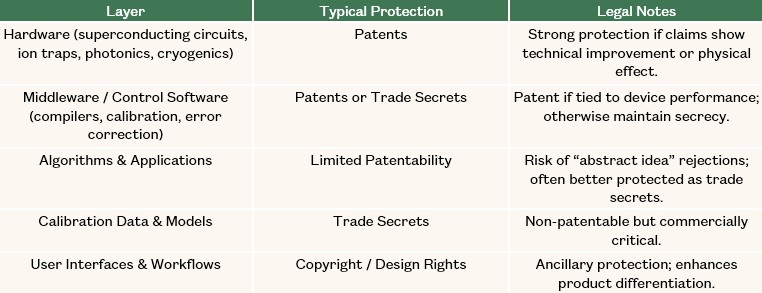Intellectual Property for Quantum Startups: Building Defensible Innovation in a Non-Classical World
Erika R. Knierim
–
October 25, 2025

Quantum computing has reached the transition from laboratory research to commercial deployment. As superconducting, photonic, and ion-trap systems mature, founders are discovering that while the physics is complex, the law can be even more so. Unlike classical computing, quantum technologies sit in largely untested legal territory. The companies that succeed will not only build reliable qubits—they’ll build defensible intellectual property architectures around them.
At Founders Law, we work with quantum companies at this exact inflection point—when scientific discovery becomes a commercial asset.
1. Defining the Quantum IP Stack
Every quantum company operates across multiple layers of innovation. Each layer demands its own IP strategy.

2. Patentability in a Post-Alice Landscape
Under U.S. law, quantum algorithms are patentable only when they demonstrate a specific technological improvement.
Founders should:
- Frame claims around physical implementation and measurable performance gains.
- Avoid purely abstract or mathematical claims.
- File parallel applications in Europe and Asia, where “technical effect” standards are more flexible.
Patents work best when they describe engineering, not theory.
3. Trade Secrets and the Long R&D Cycle
Quantum development is slow and cumulative. Most proprietary advantage lives in:
- Fabrication recipes and materials processes
- Calibration and control routines
- Noise models and yield data
- Simulation and benchmarking datasets
Protect these as trade secrets through:
- NDAs and IP assignment agreements
- Tiered data access and audit trails
- Clear confidentiality culture for employees and collaborators
Strong trade-secret governance signals investor readiness and operational maturity.
4. Collaboration: Where Value Leaks
Most quantum startups emerge from universities or national labs. That heritage creates both opportunity and risk.
- Bayh-Dole compliance: Ensure clean assignments when licensing university IP.
- Background vs. Foreground IP: Define each explicitly in collaboration agreements.
- Publication review: Build 60–90-day windows for patent filing before public disclosure.
- Data rights: Decide who owns raw and processed data—and how it can be reused.
Well-crafted agreements preserve both scientific openness and commercial protection.
5. Standards, Open Source, and the Commons
Open-Source Codebases
Quantum frameworks (Qiskit, Cirq, PennyLane) are often Apache-licensed, but dependencies vary. Keep a license bill of materials, require contributor license agreements (CLAs), and avoid license contamination that could force unintended disclosure.
Standards and FRAND
Participation in emerging quantum networking standards (ETSI, ITU-T, ISO) may trigger FRAND licensing. File provisional patents before contributing and set an internal policy for how essential patents will be licensed.
6. Export Controls and Cross-Border Risk
Quantum hardware, control electronics, and certain algorithms now fall under U.S. Export Administration Regulations (EAR).
Risks:
- Sharing controlled data with foreign nationals (“deemed exports”)
- Remote access to controlled designs or systems
- Public patent filings disclosing controlled technology
Coordinate export classification, hiring, and cloud architecture with counsel early—before contracts or publications.
7. Preparing for Diligence and Investment
Investors increasingly expect quantum startups to demonstrate IP discipline.
During diligence they will ask:
- Are all contributors under IP assignment agreements?
- Are university or government rights fully licensed?
- Are patents current and properly prosecuted?
- Are trade secrets documented and secured?
- Have export classifications been completed?
Clean IP is investable IP.
8. Building a Quantum-Ready IP Program
A practical roadmap for founders:
- Inventory inventions across hardware, software, and data.
- Triage: patent, trade secret, or publish defensively.
- Schedule rolling provisional filings every 6–12 months.
- Control access and document confidentiality measures.
- Review contracts for IP, data, and export clauses.
- Educate researchers on inventorship and disclosure rules.
- Engage IP counsel early in funding and collaboration planning.
A disciplined cadence beats sporadic “catch-up” filings every time.
9. The Coming IP Landscape
Patent activity in quantum computing is accelerating worldwide as governments, universities, and industry players race to secure early claims. Filings are expanding across hardware design, control systems, error correction, and quantum networking — suggesting that the field is entering the same intellectual-property “arms race” once seen in semiconductors and telecommunications.
Over the next decade, expect increasing overlap between portfolios, the emergence of patent pools and standards-essential licensing, and heightened attention to data and trade-secret protection as core competitive assets.
Those who treat IP as strategic infrastructure—not paperwork—will define the field’s next era.
Stewardship in the Age of Uncertainty
Quantum computing challenges law to keep pace with science. When innovation becomes probabilistic, the lawyer’s role is to create interpretability—to clarify ownership, accountability, and value in a non-classical world. For quantum founders, this means building not just a company, but a framework of trust and defensibility that can scale with the science.
About Founders Law
Founders Law LLC is a next-generation law firm advising startups and investors in emerging technologies—from quantum computing and AI to advanced materials and deep science.
We help founders translate breakthrough research into commercial structures: IP strategy, licensing, export compliance, and corporate governance.
More Insights & Articles

Founder Control, Board Governance, and Voting Power: What the Chicago Bears Teach Startup Founders About Dual-Class Stock and Long-Term Control

Do You Need a Holding Company? A Founder’s Guide

Controlling your IP Means Controlling Your Future: What Stephen Curry’s Under Armour Split Teaches Founders About Brand Ownership

Founder Equity Splits & Re-Splits: Getting It Right Before You Raise

Who We Are: The Law Firm for the Founder of the Future

How Venture Capital Evaluates Quantum IP Portfolios

Equity Incentive Plans: Because Team Retention Requires More Than Free Pizza

Negotiating a Founders’ Agreement

Data Rooms and Due Diligence: Raising Capital from Investors

The Big FAQs About TOU

Operating Agreements for LLCs

The Art of Startup Resilience: Surviving and Thriving in a Bear Market

Understanding Equity Rounds: A Primer on Pre-Seed vs. Seed vs. Series A

83(b) Elections: Advantages & Disadvantages

Seller Financing in Sale Transactions

Delaware C-Corporations: The First Choice for Founders and Investors

What is a Certificate of Incorporation?

Playing it "SAFE" with Pre-Seed Financing


